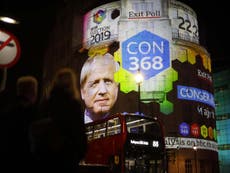Boris Johnson's ‘new’ government is finding clever ways to avoid scrutiny
With a comfortable majority of 80, ministers might feel able to bully the broadcasters outside of an election

Boris Johnson promised a “new government” after his election win. But after a mini-reshuffle of his cabinet last night, it looks remarkably like the old government.
The real reshuffle, planned for February, will tell us a lot more about the direction of Johnson’s government. Several current ministers will have an anxious Christmas, wondering whether they still be in the cabinet in a few weeks. They include those who had little or no profile during the election campaign, such as Jacob Rees-Mogg, Andrea Leadsom and Liz Truss.
The post-election shake-up turned to be a mini-mini reshuffle. The new Welsh secretary is Simon Hart, former chief executive of the pro-fox hunting Countryside Alliance. He succeeds Alun Cairns, who resigned at the start of the election campaign.
The most eagerly-awaited appointment was of a new culture secretary, after Nicky Morgan stood down as an MP at the election. But the post will now be held by…..Baroness Nicky Morgan, who has been handed a peerage so she can carry on. Any relief among broadcasters who feared the appointment of a BBC sceptic, such as John Whittingdale, could be short-lived, however; Morgan will likely leave the post in the February reshuffle.
Heading the ministry of Digital, Culture, Media and Sport is not normally seen as a big cabinet job, but will be something of a hot seat this time. Relations between the government and broadcasters are strained after the election. On Johnson’s worst day of the campaign – when he mishandled the case of the four-year-old boy sleeping on the floor of Leeds General Infirmary – he conjured up a distraction: casting doubt on the future of the BBC licence fee. The trick worked: pro-Tory newspapers put the story, rather than the state of the NHS, on their front page.
Morgan and her successor will consider whether to decriminalise non-payment of the £154.50-a-year licence fee. Ministers claim more than 3,000 non-payment cases a week clog up magistrates courts. But a government-ordered review found they took up only 0.3 per cent of court time, and the BBC has warned that making non-payment a civil matter could cost it up to £200m a year.
The BBC’s bigger concern is Johnson’s hint that the licence fee might be abolished in the long run. With audiences fragmenting and viewing habits changing, there is legitimate debate to be had about whether the BBC should be funded by subscription rather than what Johnson called “a general tax”. But its charter runs until 2027, so it was rather early for the government to speculate about the licence fee, which brings in £3.6bn a year.
The two moves are seen as a shot across the BBC’s bows. Johnson allies think a line was crossed by Andrew Neil’s excoriating monologue to the camera about Johnson’s refusal to be interviewed by him. Ministers are boycotting BBC Radio 4’s flagship Today programme, with a Tory source claiming it is “stuck in a Remainer, Islington bubble”. Perhaps Tory aides think the questions will be a bit softer when ministers are on a breakfast time TV sofa.
Meanwhile, Number 10 shows no sign of forgiving Channel 4’s decision to replace Johnson with a melting ice sculpture when he refused to join a party leaders’ debate on climate change. The Tories’ petulant response was to threaten a review of Channel 4’s public service broadcasting remit.
There’s a pattern of behaviour here which should worry us. With a comfortable majority of 80, ministers might feel able to bully the broadcasters outside of an election; during a campaign, complaints by all parties are par for the course. The BBC is also in Labour’s crosshairs. It is furious that Johnson escaped the mauling that Jeremy Corbyn suffered at Neil’s hands. Corbyn did his interview on the understanding the Tories had also signed up to a package of debates and interviews – including one with Neil.
The answer is for election debates to be sorted well in advance by an independent commission. Johnson supported this when Sky News launched a campaign last year but (surprise, surprise) seems to have gone cool on the idea. That’s the problem: governing parties rig the rules to suit their interests.
Labour is angry the BBC highlighted criticism of Corbyn in vox-pop interviews with voters. Given the result, Labour has nothing to complain about, or to justify the claim by Andy McDonald, the shadow transport secretary, that a “consciously” biased BBC “played a part” in Labour’s defeat. Labour has legitimate complaints about much of the national press. But blaming its disastrous result on the wicked media won’t wash.
If the BBC is under fire from both sides of the political divide, I suspect it is doing its job properly. In their BBC-bashing, the Tories and Labour are as bad as each other. In my experience, the corporation goes to enormous lengths to avoid bias and ensure balance. The long-term futures of the BBC and Channel 4 should be decided on their merits. They are too important to be used to settle scores after the election, and a means of putting pressure on broadcasters about their future coverage.



Join our commenting forum
Join thought-provoking conversations, follow other Independent readers and see their replies